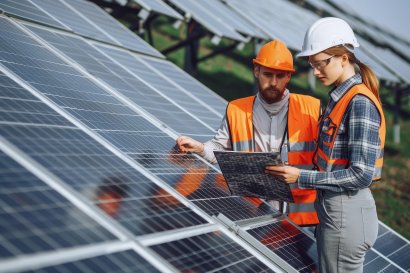Live Seminar: Fundamentals of Renewable Energy & Strategic Energy Storage Solutions
Course description
This course caters to Engineers, Technicians, Facilities Managers, Energy Professionals, Architects and others who are interested in enhancing their understanding of renewable energy. You will learn about methods, best practices, and strategies for selection of the most suitable renewable energy alternative and/or suitable energy storage system, with technical, geographic and financial feasibility in mind.
Introduction to a few important fundamentals of energy, statistics, and the “grid” sets the tone for better comparison of current source of energy with optimal renewable energy alternative. Importance of the concept of most direct application of renewable source to the final energy demand point is highlighted and illustrated through clearly explained examples. The seminar then dives into some of the more proven and mainstream renewable energy and energy storage topics, like hydroelectric power, wave and tidal energy, wind energy, various types of solar energy, geothermal energy, multiple biomass alternatives, and various proven energy storage technologies.
Current footprint and relative cost differences between some of the major renewable energy sources and storage systems are examined. Strengths, weaknesses, opportunities and threats pertaining to some of the mainstream renewable energy solutions and energy storage systems are discussed. The capacity factor of various renewable energy technologies are compared and discussed. The discussion on the topic of renewable energy is sustained by diagrams, schematics and pictures pertaining to major renewable energy generation and storage systems.
Let Us Guide You!
Learn how the Renewable Energy and Energy Storage Technologies Course can help your career!
Why Choose this Course?
Upon successful completion of this course, participants will be able to:
- Perform technical/engineering and cost comparisons between energy obtained from the grid versus the energy harnessed from proven renewable sources. Identify and quantify technical and financial benefits of renewable energy sources and energy storage systems.
- Specify and implement proven renewable energy systems that leverage direct application of renewable energy sources to the point of use, thus maximizing the efficiency and net benefit of renewable energy sources and energy storage systems.
- Examine and assess alternative proven renewable energy technologies based on physics and engineering principles. Assess the performance of proven renewable energy systems on the basis of physics and engineering equations that correlate physical parameters to the power and energy output of wind turbines. These equations serve as tools in design, analysis, suitable location selection, and application of wind turbines. Utilize physics and engineering principles and equations to evaluate the performance of hydroelectric turbines.
- Evaluate technical and engineering strengths and weaknesses of major renewable energy technologies like hydroelectric, tidal, wave, wind, geothermal, solar heat, solar light, solar PV, solar chimney, and biomass.
- Follow progress on some of the major, more recent, notable proven renewable projects in the world. Benefit from the lessons on these projects in avoiding pitfalls in the design and specification of renewable energy sources and energy storage systems.
- Identify some of the more unbiased and reliable technical and commercial information sources in the renewable energy arena.
Professor S. Bobby Rauf, PE, CEM, CMT, CE, MBA, is a highly esteemed instructor and author who brings extensive professional and consulting experience to the classroom. He is certified to instruct various engineering, ergonomics, and industrial safety courses. He has conducted certification training and trained engineers for Professional Engineering licensure exams in the United States, the UK, Saudi Arabia, the Netherlands, and Ukraine.
During his career as a Senior Staff Engineer, he developed and maintained energy and ergonomics programs for multiple manufacturing plants in the US and overseas. He also provided consultation and training services in energy, electrical engineering, industrial safety, ergonomics and arc flash arena. His extensive engineering experience includes power design, control system design, project management, process management, energy and utilities management, energy audits/assessments, plant maintenance, robotics, manufacturing automation, HVAC audits, and design of ergonomic equipment.
This course caters to Engineers, Technicians, Facilities Managers, Energy Professionals, Architects, and others who are interested in enhancing their understanding of renewable energy. It provides the opportunity to learn about methods, best practices, and strategies for the selection of the most suitable renewable energy alternative and/or suitable energy storage system, with technical, geographic, and financial feasibility in mind.
Upon successful completion of this course, participants will be able to:
- Perform technical/engineering and cost comparisons between energy obtained from the grid versus the energy harnessed from proven renewable sources. Identify and quantify technical and financial benefits of renewable energy sources and energy storage systems.
- Specify and implement proven renewable energy systems that leverage direct application of renewable energy sources to the point of use, thus maximizing the efficiency and net benefit of renewable energy sources and energy storage systems.
- Examine and assess alternative proven renewable energy technologies based on physics and engineering principles. Assess the performance of proven renewable energy systems on the basis of physics and engineering equations that correlate physical parameters to the power and energy output of wind turbines. These equations serve as tools in design, analysis, suitable location selection, and application of wind turbines. Utilize physics and engineering principles and equations to evaluate the performance of hydroelectric turbines.
- Evaluate technical and engineering strengths and weaknesses of major renewable energy technologies like hydroelectric, tidal, wave, wind, geothermal, solar heat, solar light, solar PV, solar chimney, and biomass.
- Follow progress on some of the major, more recent, notable proven renewable projects in the world. Benefit from the lessons on these projects in avoiding pitfalls in the design and specification of renewable energy sources and energy storage systems.
- Identify some of the more unbiased and reliable technical and commercial information sources in the renewable energy arena.
Professor S. Bobby Rauf, PE, CEM, CMT, CE, MBA, is a highly esteemed instructor and author who brings extensive professional and consulting experience to the classroom. He is certified to instruct various engineering, ergonomics, and industrial safety courses. He has conducted certification training and trained engineers for Professional Engineering licensure exams in the United States, the UK, Saudi Arabia, the Netherlands, and Ukraine.
During his career as a Senior Staff Engineer, he developed and maintained energy and ergonomics programs for multiple manufacturing plants in the US and overseas. He also provided consultation and training services in energy, electrical engineering, industrial safety, ergonomics and arc flash arena. His extensive engineering experience includes power design, control system design, project management, process management, energy and utilities management, energy audits/assessments, plant maintenance, robotics, manufacturing automation, HVAC audits, and design of ergonomic equipment.
This course caters to Engineers, Technicians, Facilities Managers, Energy Professionals, Architects, and others who are interested in enhancing their understanding of renewable energy. It provides the opportunity to learn about methods, best practices, and strategies for the selection of the most suitable renewable energy alternative and/or suitable energy storage system, with technical, geographic, and financial feasibility in mind.
Course Information
- Licensed PE’s, Professional Engineers, and CEM’s, Certified Energy Managers, who need to meet the license or certification renewal PDH (Professional Development Hour) or CEU (Continuing Education Unit) requirements. This energy seminar couples engineering concepts and knowledge with renewable energy concepts and best practices.
- Facility Managers, Plant Engineers, Engineering Managers, Energy Professionals, Architects, Project Managers and other Executives who feel a need to enhance their renewable energy engineering knowledge, to make informed decisions on renewable energy projects or programs.
- Professionals who do not possess prior experience or knowledge in the renewable energy realm, including Project Management Staff, Energy Project Financial Analysts and Technical Writers.
- Procurement/Purchasing Professionals who are responsible for obtaining renewable energy project proposals.
- Construction managers who manage renewable energy project installations.
- Other professionals whose annual PLP, Performance and Learning Program, include energy engineering courses, training, or seminars.
In just one 8-hour day on the ODU campus or via Zoom, you will be able to identify the most suitable proven renewable energy alternative for your operations or those of your clients. You will gain a greater depth and breadth in your understanding of renewable energy sources and energy storage systems which will enable you to better lead or manage a group of energy or engineering professionals. You will learn about some proven approaches – both technical and financial – for successful renewable energy project funding and implementation.
Participants are kept engaged through questions and answers, discussions, and classwork. Board acceptance guarantee.
Professor S. Bobby Rauf, PE, CEM, CMT, CE, MBA
Professor S. Bobby Rauf is the President, Chief Consultant and Senior Instructor at Sem-Train, LLC. Bobby has over 25 years of experience in teaching undergraduate and post-graduate Engineering, Math, Business Administration, and MBA courses, seminars, and workshops. Professor Rauf is a registered (PE) Professional Engineer, in the States of Virginia, North Carolina, and Wyoming and is a Certified Energy Manager (CEM) and a Certified Ergonomist (CE). He holds memberships in the Association of Energy Engineers (AEE), the National Society of Professional Engineers (NSPE), and the American Society of Engineering Education (ASEE).
Professor Rauf was inducted as “Legend in Energy” by AEE, in 2014. He is a published author of multiple engineering and energy books and professional development courses. He holds a patent in process controls technology.
Professor Rauf is certified to instruct various engineering, ergonomics, and industrial safety courses. He has conducted certification training and trained engineers for Professional Engineering licensure exams in the United States, The United Kingdom, Kingdom of Saudi Arabia, The Netherlands and Ukraine, over the past ten years.
Join our Next Class!
Cancellation Policy
To withdraw from a course you must send a request in writing to cepd@odu.edu seven (7) days prior to the start date of the course. Failure to attend a course does not constitute withdrawal. Course registration fees, less a $50 processing fee will be refunded via the original form of payment. There are no refunds once the class has begun. Late withdrawals of six (6) days or less before the class begins, will result in the student being charged the $50 processing fee, as well as charges for books and/or other course material fees.




